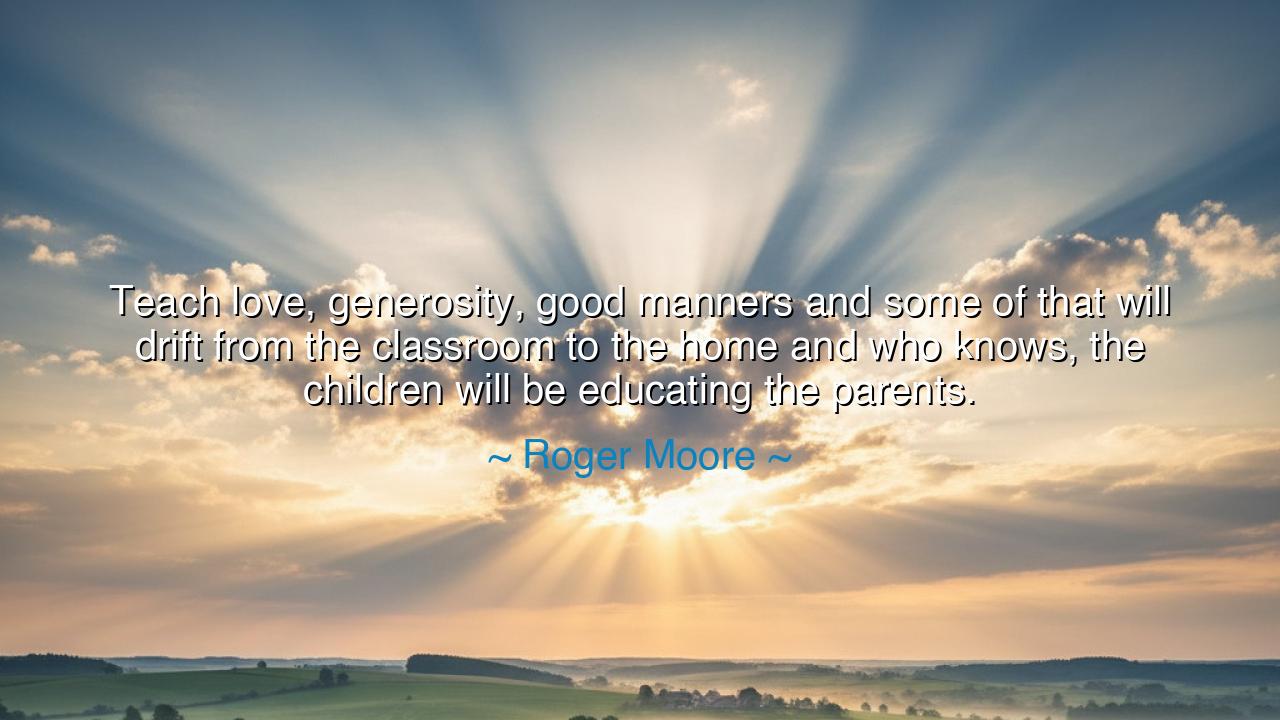
Teach love, generosity, good manners and some of that will drift
Teach love, generosity, good manners and some of that will drift from the classroom to the home and who knows, the children will be educating the parents.






When Roger Moore said, “Teach love, generosity, good manners and some of that will drift from the classroom to the home and who knows, the children will be educating the parents,” he spoke as a wise elder reflecting upon the eternal cycle of virtue and learning. His words are both gentle and revolutionary, for they suggest that true education is not confined to the walls of a school, but ripples outward through the generations, transforming not only the young but the old as well. This quote, simple in form yet profound in substance, reminds us that the values we plant in the hearts of children can one day heal the world.
At its heart, Moore’s message is an ode to love, the greatest of all lessons. To teach love is to teach humanity itself—to awaken empathy, patience, and understanding in young minds. In the ancient world, philosophers like Plato believed that education was not merely the filling of the mind, but the shaping of the soul. When a teacher imparts kindness, they do more than instruct; they ignite a light that spreads from person to person, from classroom to home, until it warms the entire community. Moore understood that love is contagious, and that a generation raised in compassion becomes the silent reformer of a society grown cold.
To teach generosity is to teach abundance of spirit. Generosity does not belong only to the wealthy, but to all who give freely of what they have—whether that be time, patience, or understanding. In ancient India, sages taught the virtue of dāna, the sacred act of giving without expectation. They believed that the heart expands each time we offer something for another’s good. When Moore speaks of generosity drifting from the classroom to the home, he envisions a world where a child’s kindness to a classmate inspires the same in a parent, where the young become unwitting teachers of the virtues adults may have forgotten.
Then comes the lesson of good manners, which, though humble, is the foundation of civilization. Courtesy is not mere politeness—it is respect made visible. It is the recognition of dignity in every soul, a reminder that the smallest gestures—holding a door, listening with care, speaking with gentleness—are acts of peace. The ancients understood this well: in Confucian philosophy, the observance of ritual manners, known as li, was the glue that held society together. When we teach children to act with grace, we are not training them to please others, but to live in harmony with the world. Moore saw this not as an old-fashioned virtue, but as a timeless art.
And when he says, “the children will be educating the parents,” his words shine with both humility and hope. He suggests that wisdom does not always descend from age to youth; sometimes it rises upward, carried by innocence. There is something divine in the way a child reminds us of truths we have buried—how to forgive quickly, to see joy in small things, to speak honestly. The Roman philosopher Seneca once said, “Men learn while they teach.” Moore’s vision extends this further: that society itself may be renewed when the young, guided by compassion, gently lead their elders back to virtue.
Consider the story of King Ashoka, the warrior emperor of ancient India. After years of conquest and bloodshed, it was not a sage or priest who changed him, but the quiet teachings of compassion he had heard in childhood—echoes of lessons long forgotten. He remembered the simple truths of kindness and respect, and from that remembrance, an empire was transformed. In the same way, Moore’s belief reminds us that the moral education of children is not merely preparation for their own lives, but a quiet revolution that may one day reshape the hearts of those who raised them.
Thus, the lesson is clear: teach values, not only knowledge. Teach love before ambition, kindness before cleverness. The world is filled with educated minds but starved of enlightened hearts. Parents and teachers alike must see themselves as cultivators of virtue, sowing seeds of compassion that will grow long after they are gone. Every smile encouraged, every act of sharing, every word of gratitude may ripple through time in ways unseen.
So let the wisdom of Roger Moore stand as a call to all who guide the young: begin the change where it matters most. Teach with gentleness, nurture with example, and believe that the lessons of goodness will travel farther than you can imagine. For one day, when the children begin teaching the adults how to live with love and dignity, the circle of wisdom will be complete—and humanity will have taken one step closer to its higher self.






AAdministratorAdministrator
Welcome, honored guests. Please leave a comment, we will respond soon